《新概念英语》真的就那么完美无缺吗
- 格式:doc
- 大小:26.00 KB
- 文档页数:3
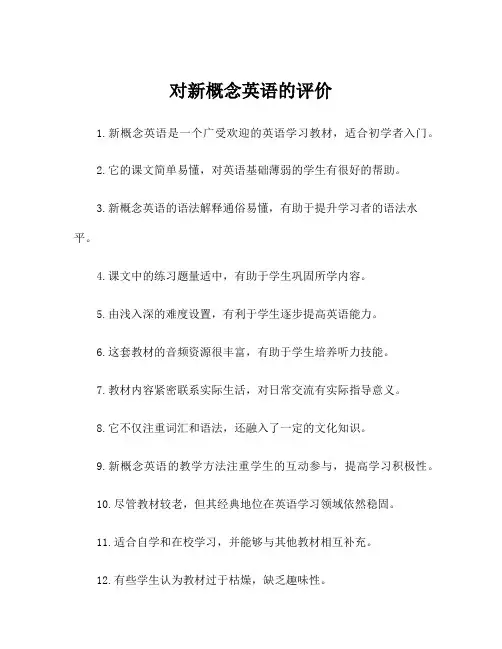
对新概念英语的评价
1.新概念英语是一个广受欢迎的英语学习教材,适合初学者入门。
2.它的课文简单易懂,对英语基础薄弱的学生有很好的帮助。
3.新概念英语的语法解释通俗易懂,有助于提升学习者的语法水平。
4.课文中的练习题量适中,有助于学生巩固所学内容。
5.由浅入深的难度设置,有利于学生逐步提高英语能力。
6.这套教材的音频资源很丰富,有助于学生培养听力技能。
7.教材内容紧密联系实际生活,对日常交流有实际指导意义。
8.它不仅注重词汇和语法,还融入了一定的文化知识。
9.新概念英语的教学方法注重学生的互动参与,提高学习积极性。
10.尽管教材较老,但其经典地位在英语学习领域依然稳固。
11.适合自学和在校学习,并能够与其他教材相互补充。
12.有些学生认为教材过于枯燥,缺乏趣味性。
13.随着学习深入,有些学生可能需要额外的拓展教材。
14.部分内容可能与现代社会的实际需求有所脱节。
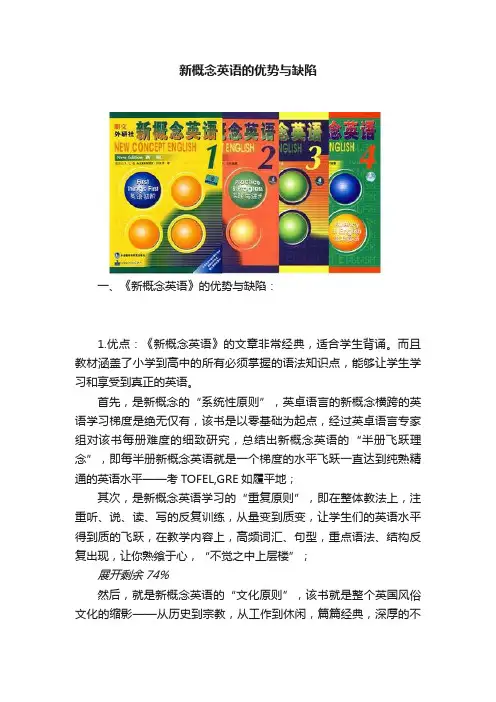
新概念英语的优势与缺陷一、《新概念英语》的优势与缺陷:1.优点:《新概念英语》的文章非常经典,适合学生背诵。
而且教材涵盖了小学到高中的所有必须掌握的语法知识点,能够让学生学习和享受到真正的英语。
首先,是新概念的“系统性原则”,英卓语言的新概念横跨的英语学习梯度是绝无仅有,该书是以零基础为起点,经过英卓语言专家组对该书每册难度的细致研究,总结出新概念英语的“半册飞跃理念”,即每半册新概念英语就是一个梯度的水平飞跃一直达到纯熟精通的英语水平——考TOFEL,GRE如履平地;其次,是新概念英语学习的“重复原则”,即在整体教法上,注重听、说、读、写的反复训练,从量变到质变,让学生们的英语水平得到质的飞跃,在教学内容上,高频词汇、句型,重点语法、结构反复出现,让你熟飨于心,“不觉之中上层楼”;展开剩余74%然后,就是新概念英语的“文化原则”,该书就是整个英国风俗文化的缩影——从历史到宗教,从工作到休闲,篇篇经典,深厚的不列颠文化底蕴和浓郁的英格兰风情跃然纸上,深邃而耐人寻味;再有,就是新概念英语的“实用原则”,该书无论是从听、说、读、写哪一方面都可以无可厚非地成为经典教材,吃透新概念,英语运用即可娴熟自如,独步天下!2.缺陷:一来《新概念英语》本身不具备较为正规的测评系统,没有考试,以至于学生很难全面客观地检验学习效果;二来《新概念英语》的知识比较陈旧,与当代发生的新事,当前热门的话题,当下关注度高的问题稍有脱离。
如此,学生在学习《新概念英语》的时候要尽可能地发挥它本身所具有的优势,同时,也要尽量去弥补新概念的薄弱之处。
二、如何弥补新概念英语的薄弱之处?【学习目标】:通过学习和背诵新概念的经典文章,学生能够系统学习英语的语法,全面提高听、说、读、写各项能力,为考级和考证打好基础。
为了达到上述学习目标,英语网教研组的专家和老师们经过潜心研究,提出如下建议:1.学生对新概念的系统学习内容应包含两大板块:第一版块:以新概念的教材为主线,重点学习的知识点如下:《新概念》一册:学习基本的英语语音知识及英语的基本语法、词汇、句型等知识,练好英语基本功。
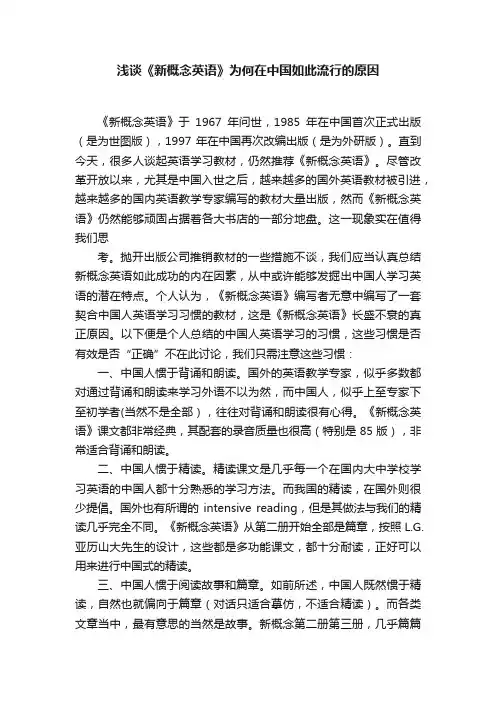
浅谈《新概念英语》为何在中国如此流行的原因《新概念英语》于1967年问世,1985年在中国首次正式出版(是为世图版),1997年在中国再次改编出版(是为外研版)。
直到今天,很多人谈起英语学习教材,仍然推荐《新概念英语》。
尽管改革开放以来,尤其是中国入世之后,越来越多的国外英语教材被引进,越来越多的国内英语教学专家编写的教材大量出版,然而《新概念英语》仍然能够顽固占据着各大书店的一部分地盘。
这一现象实在值得我们思考。
抛开出版公司推销教材的一些措施不谈,我们应当认真总结新概念英语如此成功的内在因素,从中或许能够发掘出中国人学习英语的潜在特点。
个人认为,《新概念英语》编写者无意中编写了一套契合中国人英语学习习惯的教材,这是《新概念英语》长盛不衰的真正原因。
以下便是个人总结的中国人英语学习的习惯,这些习惯是否有效是否“正确”不在此讨论,我们只需注意这些习惯:一、中国人惯于背诵和朗读。
国外的英语教学专家,似乎多数都对通过背诵和朗读来学习外语不以为然,而中国人,似乎上至专家下至初学者(当然不是全部),往往对背诵和朗读很有心得。
《新概念英语》课文都非常经典,其配套的录音质量也很高(特别是85版),非常适合背诵和朗读。
二、中国人惯于精读。
精读课文是几乎每一个在国内大中学校学习英语的中国人都十分熟悉的学习方法。
而我国的精读,在国外则很少提倡。
国外也有所谓的intensive reading,但是其做法与我们的精读几乎完全不同。
《新概念英语》从第二册开始全部是篇章,按照L.G.亚历山大先生的设计,这些都是多功能课文,都十分耐读,正好可以用来进行中国式的精读。
三、中国人惯于阅读故事和篇章。
如前所述,中国人既然惯于精读,自然也就偏向于篇章(对话只适合摹仿,不适合精读)。
而各类文章当中,最有意思的当然是故事。
新概念第二册第三册,几乎篇篇都是故事,自然很受欢迎。
我在当当网和卓越网的外语图书销售排行榜上看到,《新概念英语》第二册和第三册销量要比第一册和第四册好,故事性强可能是原因之一。
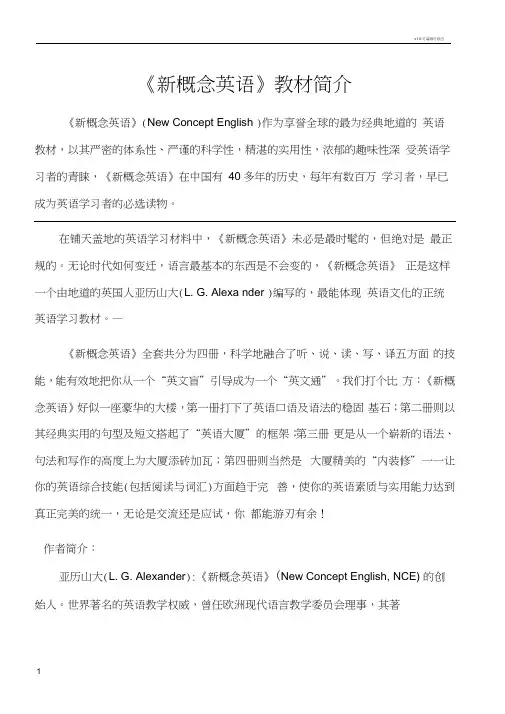
《新概念英语》教材简介《新概念英语》(New Concept English )作为享誉全球的最为经典地道的英语教材,以其严密的体系性、严谨的科学性,精湛的实用性,浓郁的趣味性深受英语学习者的青睐,《新概念英语》在中国有40多年的历史,每年有数百万学习者,早已成为英语学习者的必选读物。
在铺天盖地的英语学习材料中,《新概念英语》未必是最时髦的,但绝对是最正规的。
无论时代如何变迁,语言最基本的东西是不会变的,《新概念英语》正是这样一个由地道的英国人亚历山大(L. G. Alexa nder )编写的,最能体现英语文化的正统英语学习教材。
—《新概念英语》全套共分为四册,科学地融合了听、说、读、写、译五方面的技能,能有效地把你从一个“英文盲”引导成为一个“英文通”。
我们打个比方:《新概念英语》好似一座豪华的大楼,第一册打下了英语口语及语法的稳固基石;第二册则以其经典实用的句型及短文搭起了“英语大厦”的框架;第三册更是从一个崭新的语法、句法和写作的高度上为大厦添砖加瓦;第四册则当然是大厦精美的“内装修”一一让你的英语综合技能(包括阅读与词汇)方面趋于完善,使你的英语素质与实用能力达到真正完美的统一,无论是交流还是应试,你都能游刃有余!作者简介:亚历山大(L. G. Alexander):《新概念英语》(New Concept English, NCE) 的创始人。
世界著名的英语教学权威,曾任欧洲现代语言教学委员会理事,其著作为交际教学法奠定基础,其中一些如NCE和Follow Me已成经典教材。
他的《朗文英语语法》也是语法书中的佳作,至今畅销世界。
Direct En glish (《直捷英语》)是他在有生之年最后为英语学习者奉献的巅峰之作。
第一册《英语初阶》学习英语的敲门砖(First Things First )讲练基本语音、语调(包括所有的音标、连读、同化)及英语中的基本语法、词法、句法及句型结构知识。
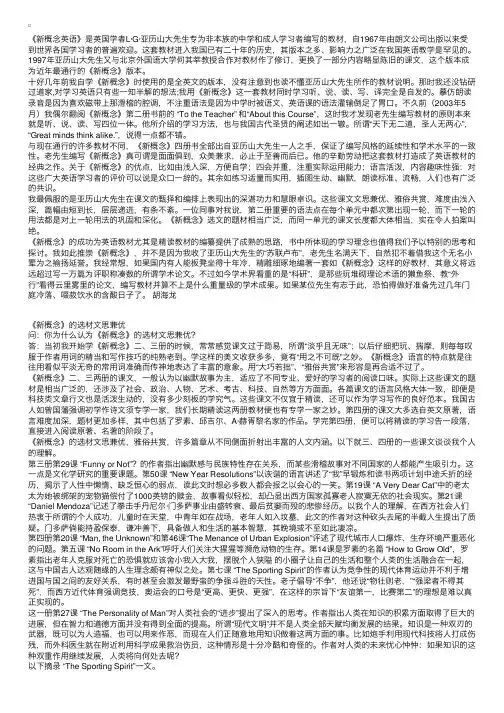
《新概念英语》是英国学者L·G·亚历⼭⼤先⽣专为⾮本族的中学和成⼈学习者编写的教材,⾃1967年由朗⽂公司出版以来受到世界各国学习者的普遍欢迎。
这套教材进⼊我国已有⼆⼗年的历史,其版本之多、影响⼒之⼴泛在我国英语教学是罕见的。
1997年亚历⼭⼤先⽣⼜与北京外国语⼤学何其莘教授合作对教材作了修订,更换了⼀部分内容略显陈旧的课⽂,这个版本成为近年最通⾏的《新概念》版本。
⼗好⼏年前我⾃学《新概念》时使⽤的是全英⽂的版本,没有注意到也读不懂亚历⼭⼤先⽣所作的教材说明。
那时我还没钻研过道家,对学习英语只有些⼀知半解的想法;我⽤《新概念》这⼀套教材同时学习听、说、读、写、译完全是⾃发的。
摹仿朗读录⾳是因为喜欢磁带上那滑稽的腔调,不注重语法是因为中学时被语⽂、英语课的语法灌输倒⾜了胃⼝。
不久前(2003年5⽉)我偶尔翻阅《新概念》第⼆册书前的 “To the Teacher” 和“About this Course”,这时我才发现⽼先⽣编写教材的原则本来就是听、说、读、写四位⼀体。
他所介绍的学习⽅法,也与我国古代圣贤的阐述如出⼀辙。
所谓“天下⽆⼆道,圣⼈⽆两⼼”,“Great minds think alike.”,说得⼀点都不错。
与现在通⾏的许多教材不同,《新概念》四册书全部出⾃亚历⼭⼤先⽣⼀⼈之⼿,保证了编写风格的延续性和学术⽔平的⼀致性。
⽼先⽣编写《新概念》真可谓是⾯⾯俱到,众美兼求,必⽌于⾄善⽽后已。
他的⾟勤劳动把这套教材打造成了英语教材的经典之作。
关于《新概念》的优点,⽐如由浅⼊深,⽅便⾃学;四会并重,注重实际运⽤能⼒;语⾔活泼,内容趣味性强:对这些⼴⼤英语学习者的评价可以说是众⼝⼀辞的。
其余如练习适量⽽实⽤,插图⽣动、幽默,朗读标准、流畅,⼈们也有⼴泛的共识。
我最佩服的是亚历⼭⼤先⽣在课⽂的甄择和编排上表现出的深湛功⼒和慧眼卓识。
这些课⽂⽂思兼优、雅俗共赏,难度由浅⼊深,篇幅由短到长,层层递进,有条不紊。
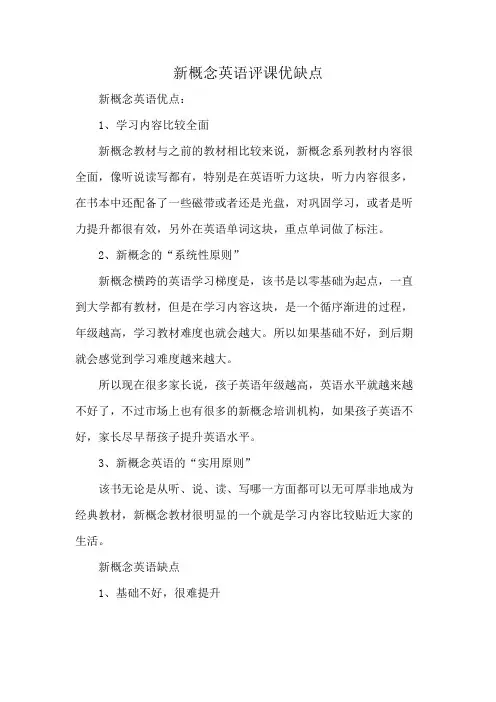
新概念英语评课优缺点
新概念英语优点:
1、学习内容比较全面
新概念教材与之前的教材相比较来说,新概念系列教材内容很全面,像听说读写都有,特别是在英语听力这块,听力内容很多,在书本中还配备了一些磁带或者还是光盘,对巩固学习,或者是听力提升都很有效,另外在英语单词这块,重点单词做了标注。
2、新概念的“系统性原则”
新概念横跨的英语学习梯度是,该书是以零基础为起点,一直到大学都有教材,但是在学习内容这块,是一个循序渐进的过程,年级越高,学习教材难度也就会越大。
所以如果基础不好,到后期就会感觉到学习难度越来越大。
所以现在很多家长说,孩子英语年级越高,英语水平就越来越不好了,不过市场上也有很多的新概念培训机构,如果孩子英语不好,家长尽早帮孩子提升英语水平。
3、新概念英语的“实用原则”
该书无论是从听、说、读、写哪一方面都可以无可厚非地成为经典教材,新概念教材很明显的一个就是学习内容比较贴近大家的生活。
新概念英语缺点
1、基础不好,很难提升
不少家长说,孩子英语如果一学期没有好好学习,那么后面学习就很吃力,难度比较大,很难弥补。
2、单词部分不明确
重点单词做了标记,但是有些重点单词没有做标记,也导致很多孩子认为非重点单词学习不重要。
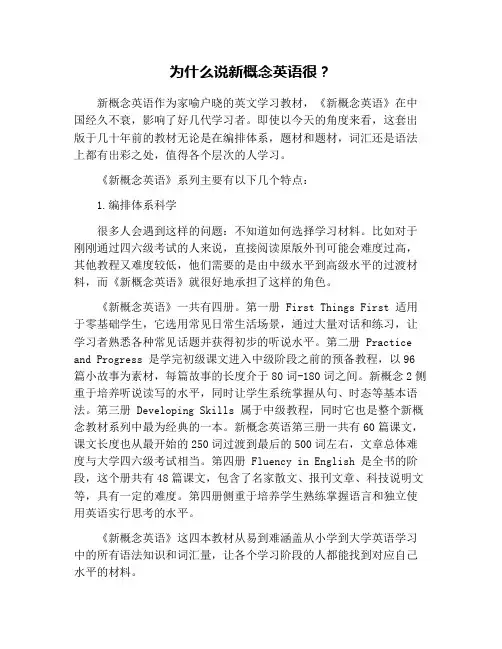
为什么说新概念英语很?新概念英语作为家喻户晓的英文学习教材,《新概念英语》在中国经久不衰,影响了好几代学习者。
即使以今天的角度来看,这套出版于几十年前的教材无论是在编排体系,题材和题材,词汇还是语法上都有出彩之处,值得各个层次的人学习。
《新概念英语》系列主要有以下几个特点:1.编排体系科学很多人会遇到这样的问题:不知道如何选择学习材料。
比如对于刚刚通过四六级考试的人来说,直接阅读原版外刊可能会难度过高,其他教程又难度较低,他们需要的是由中级水平到高级水平的过渡材料,而《新概念英语》就很好地承担了这样的角色。
《新概念英语》一共有四册。
第一册 First Things First 适用于零基础学生,它选用常见日常生活场景,通过大量对话和练习,让学习者熟悉各种常见话题并获得初步的听说水平。
第二册 Practice and Progress 是学完初级课文进入中级阶段之前的预备教程,以96篇小故事为素材,每篇故事的长度介于80词-180词之间。
新概念2侧重于培养听说读写的水平,同时让学生系统掌握从句、时态等基本语法。
第三册 Developing Skills 属于中级教程,同时它也是整个新概念教材系列中最为经典的一本。
新概念英语第三册一共有60篇课文,课文长度也从最开始的250词过渡到最后的500词左右,文章总体难度与大学四六级考试相当。
第四册 Fluency in English 是全书的阶段,这个册共有48篇课文,包含了名家散文、报刊文章、科技说明文等,具有一定的难度。
第四册侧重于培养学生熟练掌握语言和独立使用英语实行思考的水平。
《新概念英语》这四本教材从易到难涵盖从小学到大学英语学习中的所有语法知识和词汇量,让各个学习阶段的人都能找到对应自己水平的材料。
2.词汇句型精彩《新概念英语》最让人印象深刻的一点在于,它的课文内容写得非常有趣,同时课文中涵盖的词汇句型对于考试以及日常写作交流来说都非常实用。
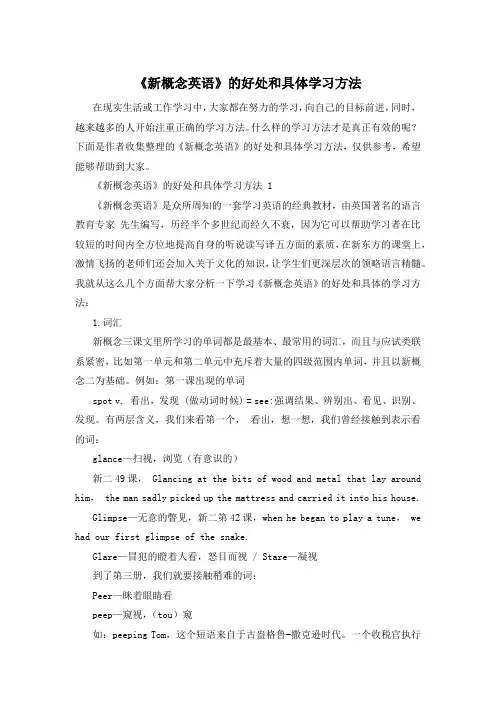
《新概念英语》的好处和具体学习方法在现实生活或工作学习中,大家都在努力的学习,向自己的目标前进,同时,越来越多的人开始注重正确的学习方法。
什么样的学习方法才是真正有效的呢?下面是作者收集整理的《新概念英语》的好处和具体学习方法,仅供参考,希望能够帮助到大家。
《新概念英语》的好处和具体学习方法 1《新概念英语》是众所周知的一套学习英语的经典教材,由英国著名的语言教育专家先生编写,历经半个多世纪而经久不衰,因为它可以帮助学习者在比较短的时间内全方位地提高自身的听说读写译五方面的素质,在新东方的课堂上,激情飞扬的老师们还会加入关于文化的知识,让学生们更深层次的领略语言精髓。
我就从这么几个方面帮大家分析一下学习《新概念英语》的好处和具体的学习方法:1.词汇新概念三课文里所学习的单词都是最基本、最常用的词汇,而且与应试类联系紧密,比如第一单元和第二单元中充斥着大量的四级范围内单词,并且以新概念二为基础。
例如:第一课出现的单词spot v. 看出,发现 (做动词时候) = see:强调结果、辨别出、看见、识别、发现。
有两层含义,我们来看第一个,看出,想一想,我们曾经接触到表示看的词:glance—扫视,浏览(有意识的)新二49课, Glancing at the bits of wood and metal that lay around him, the man sadly picked up the mattress and carried it into his house.Glimpse—无意的瞥见,新二第42课,when he began to play a tune, we had our first glimpse of the snake.Glare—冒犯的瞪着人看,怒目而视 / Stare—凝视到了第三册,我们就要接触稍难的词:Peer—眯着眼睛看peep—窥视,(tou)窥如:peeping Tom,这个短语来自于古盎格鲁-撒克逊时代。
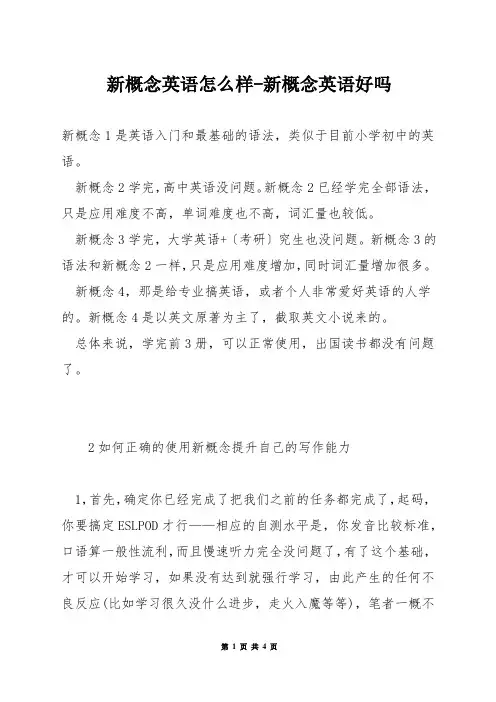
新概念英语怎么样-新概念英语好吗新概念1是英语入门和最基础的语法,类似于目前小学初中的英语。
新概念2学完,高中英语没问题。
新概念2已经学完全部语法,只是应用难度不高,单词难度也不高,词汇量也较低。
新概念3学完,大学英语+〔考研〕究生也没问题。
新概念3的语法和新概念2一样,只是应用难度增加,同时词汇量增加很多。
新概念4,那是给专业搞英语,或者个人非常爱好英语的人学的。
新概念4是以英文原著为主了,截取英文小说来的。
总体来说,学完前3册,可以正常使用,出国读书都没有问题了。
2如何正确的使用新概念提升自己的写作能力1,首先,确定你已经完成了把我们之前的任务都完成了,起码,你要搞定ESLPOD才行——相应的自测水平是,你发音比较标准,口语算一般性流利,而且慢速听力完全没问题了,有了这个基础,才可以开始学习,如果没有达到就强行学习,由此产生的任何不良反应(比如学习很久没什么进步,走火入魔等等),笔者一概不负责任2,我们必须要的设备包括:手机词典(请按照前一章自己安装一个),一支笔,一个大点的笔记本,一个很小的可供随身携带的笔记本词典软件中必须要安装的词库包括:牛津同学英语搭配词典,朗文当代英文词典,牛津同义词词典等等3,让大家大吃一惊的是,我们这里要选择的教材是:《新概念英语》2,3,4册,另外加一本语法书——文法俱乐部3如何自学新概念英语1.首先大家想要准备新概念英语课本、新概念英语学习软件(建议用沪江的新概念学习软件,它包括课文、中文解释、单词、语法等很全面)。
2.关于四级以下水平的同学,建议大家从先熟悉新概念的单词,这个也是有很多软件可以用的,然后大家从第一册开始学习。
3.关于四级及以上的同学,建议大家从第三册学习,如果时间比较充分,可以快速过一遍,便于扎实基础部分。
4.下面就是具体的学习方法了,首先我觉得关于英语的学习,听力是非常重要的。
当面对一篇新的文章时,大家可以先听几遍,把文章大致内容听懂。
5.然后大家可以看原文,把不熟悉的单词标记出来,查几遍(虽然这个是小学时候的方法了,但是我认为抄还是很有效的);关于听不懂得句子,可以看了原文之后再听几遍。
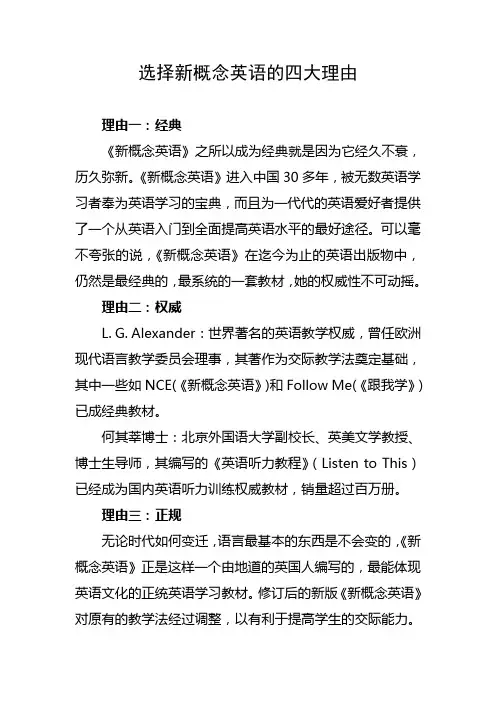
选择新概念英语的四大理由理由一:经典《新概念英语》之所以成为经典就是因为它经久不衰,历久弥新。
《新概念英语》进入中国30多年,被无数英语学习者奉为英语学习的宝典,而且为一代代的英语爱好者提供了一个从英语入门到全面提高英语水平的最好途径。
可以毫不夸张的说,《新概念英语》在迄今为止的英语出版物中,仍然是最经典的,最系统的一套教材,她的权威性不可动摇。
理由二:权威L. G. Alexander:世界著名的英语教学权威,曾任欧洲现代语言教学委员会理事,其著作为交际教学法奠定基础,其中一些如NCE(《新概念英语》)和Follow Me(《跟我学》)已成经典教材。
何其莘博士:北京外国语大学副校长、英美文学教授、博士生导师,其编写的《英语听力教程》(Listen to This)已经成为国内英语听力训练权威教材,销量超过百万册。
理由三:正规无论时代如何变迁,语言最基本的东西是不会变的,《新概念英语》正是这样一个由地道的英国人编写的,最能体现英语文化的正统英语学习教材。
修订后的新版《新概念英语》对原有的教学法经过调整,以有利于提高学生的交际能力。
从第一课开始就安排了有效的听力训练。
教材更简洁精练,过去作为补充材料单独出版的句型训练和笔头练习均已取消,其精华纳入主干教程。
理由四:系统全四册《新概念英语》科学地融合了听、说、读、写、译五方面的技能,能有效地把学习者从最初的“英文盲”引导成为一个“英文通”。
我们打个比方:《新概念英语》好似一座豪华的大楼,第一册打下了英语口语及语法的稳固基石;第二册则以其经典实用的句型及短文搭起了“英语大厦”的框架;第三册更是从一个崭新的语法、句法和写作的高度上为大厦添砖加瓦;第四册则当然是大厦精美的“内装修”——让学习者的英语综合技能(包括阅读与词汇)方面趋于完善,使其英语素质与实用能力达到真正完美的统一,无论是交流还是应试,都能游刃有余。
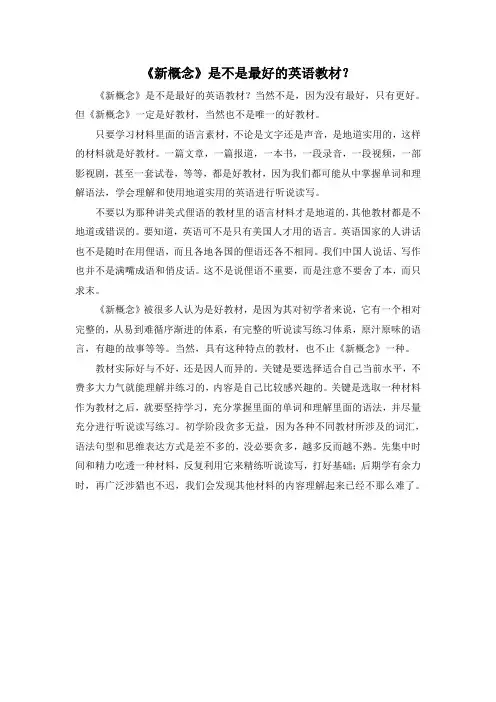
《新概念》是不是最好的英语教材?
《新概念》是不是最好的英语教材?当然不是,因为没有最好,只有更好。
但《新概念》一定是好教材,当然也不是唯一的好教材。
只要学习材料里面的语言素材,不论是文字还是声音,是地道实用的,这样的材料就是好教材。
一篇文章,一篇报道,一本书,一段录音,一段视频,一部影视剧,甚至一套试卷,等等,都是好教材,因为我们都可能从中掌握单词和理解语法,学会理解和使用地道实用的英语进行听说读写。
不要以为那种讲美式俚语的教材里的语言材料才是地道的,其他教材都是不地道或错误的。
要知道,英语可不是只有美国人才用的语言。
英语国家的人讲话也不是随时在用俚语,而且各地各国的俚语还各不相同。
我们中国人说话、写作也并不是满嘴成语和俏皮话。
这不是说俚语不重要,而是注意不要舍了本,而只求末。
《新概念》被很多人认为是好教材,是因为其对初学者来说,它有一个相对完整的,从易到难循序渐进的体系,有完整的听说读写练习体系,原汁原味的语言,有趣的故事等等。
当然,具有这种特点的教材,也不止《新概念》一种。
教材实际好与不好,还是因人而异的。
关键是要选择适合自己当前水平,不费多大力气就能理解并练习的,内容是自己比较感兴趣的。
关键是选取一种材料作为教材之后,就要坚持学习,充分掌握里面的单词和理解里面的语法,并尽量充分进行听说读写练习。
初学阶段贪多无益,因为各种不同教材所涉及的词汇,语法句型和思维表达方式是差不多的,没必要贪多,越多反而越不熟。
先集中时间和精力吃透一种材料,反复利用它来精练听说读写,打好基础;后期学有余力时,再广泛涉猎也不迟,我们会发现其他材料的内容理解起来已经不那么难了。
新概练英语的优势
新概念英语的优势包括:
1. 渐进学习:新概念英语从简单到复杂,由浅入深地进行渐进式学习,适合初学者逐步掌握英语的基础知识和技能。
2. 综合能力提升:新概念英语注重听、说、读、写全面发展,通过听力训练、口语对话、阅读理解和写作练习等多个方面的训练,帮助学习者全面提升英语综合能力。
3. 实用主题:新概念英语选取实际生活中常见的主题和场景,如购物、旅行、工作等,使学习者在学习过程中能够更好地理解和运用英语于日常生活中。
4. 语法系统性:新概念英语将语法知识渗透到每个单元中,通过例句和练习的形式帮助学习者理解和掌握英语语法规则。
5. 大量练习资源:新概念英语配有大量的练习资源,如听力材料、课后练习以及配套教材等,学习者可以通过反复练习加深对知识点的理解和记忆。
需要注意的是,新概念英语虽然有其优势,但每个人的学习方式和效果可能有所差异。
选择适合自己的学习方法和教材是提升英语能力的关键。
新概念学英语怎么样新概念之所以成为经典就是因为它经久不衰,历久弥新。
《〔新概念英语〕》正是其中的一个典范。
新概念进入中国30多年,被无数英语学习者奉为英语学习的宝典,而且为一代代的英语爱好者提供了一个从英语入门到全面提升英语水平的最好途径。
正规:在铺天盖地的英语学习材料中《新概念英语》未必是最时髦的,但绝对是最正规的。
无论时代如何变迁,语言最基本的东西是不会变的,新概念正是这样一个由地道的英国人编写的,最能体见英语文化的正统的英语学习教材。
2学习方法一单词:想要自学学好英语,单词的积存量是必不可少的。
这就跟我们想要学好中文就必须从一个个的字开始学起一样。
平常在工作或学习的地方放一本单词本,并规定在一按时间段内记住几个英语单词,注意天天规定要记住的单词量不要太多,不然没过多久必定会产生抵触情绪。
多说多写:我们现在学了这么多年的英语,水平仍不高,原因是我们总是在被动的接受所学到的英语。
如果想要真正地提升自己,我们必须主动,在生活和学习中要大声地说英语,没有倾听的对象可以自己对着书本或者〔电脑〕屏幕朗诵,有时间的朋友也可多写写,天天记录一片英文日记,这样保持肯定会有效果。
3学习方法二毅力就是说不能三天打鱼,两天晒网。
达是学好〔外语〕的大忌。
我们今天学到的新东西,都是贮存在我们大脑的临时记忆里。
临时记忆的东西有的只能保留几秒钟,最长的难以超过三天。
假如你对贮存在临时记忆里的东西不进行再利用(recycling),把它们从临时记忆贮存到长期记忆中,大脑就会把它们自动清除掉(因为大脑要保护它自己,不能把所有的临时信息都存着)。
所以,一定要有反复学习的毅力。
这里说的反复学,不是说去机械地重复原来学的东西,而是创造性地使用学过的东西。
如把原来的听力变成朗诵。
把原来的朗诵变成听力等。
有的同学毅力很差,那就最好去报名一个学习班,可以迫使自己保持下去。
4学习方法三背诵要理解性的去记忆,无须一字不落,你学英文的目的无论是说还是写都是为了能够表达思想,而不是去给别人单纯的背课文。
新概念教的好吗新概念教材是英语学习中非常经典的一套教材,也是广泛应用于中国的一套英语教材。
它被很多人称为“新概念英语”或者“新概念”,也有一些人认为它是一种“标准教材”、“入门教材”、“基础教材”等等。
但是,对于新概念教材到底好不好,这个问题没有一个绝对的答案。
下面,我将从不同的角度来分析新概念教材的利弊。
首先,从使用范围来看,新概念教材广泛适用于各个年龄段的英语学习者。
无论是初学者还是进阶者,都可以从新概念教材中获益。
这是因为新概念教材从最基本的词汇和语法入手,逐渐引导学生提高阅读和听力能力。
对于初学者来说,新概念教材提供了一个清晰的学习路径,可以帮助他们快速入门英语;对于进阶者来说,新概念教材提供了丰富多样的语言材料,可以帮助他们巩固基础,拓展知识面。
因此,从使用范围来看,新概念教材是非常好的。
其次,从教学内容来看,新概念教材注重培养学生的听、说、读、写等多方面的能力。
教材中的课文内容涵盖了生活、工作、学习等方面的话题,既有趣味性又有实用性。
这些课文通过一系列的习题和练习,帮助学生巩固所学的词汇和语法知识,并提高他们的阅读和听力能力。
此外,新概念教材还配备了丰富的听力材料和口语练习,让学生有机会在课堂上进行听说练习。
因此,从教学内容来看,新概念教材也是非常好的。
然而,新概念教材也存在一些不足之处。
首先,新概念教材注重的是语法和词汇的学习,而对于口语和交流能力的培养相对较少。
这是因为新概念教材的设计初衷是以培养学生的阅读和写作能力为主,对于口语和听力能力的培养并没有很大的侧重点。
这对于一些学生来说可能会造成一定的困扰,因为他们在实际口语交流中可能会感到不自信或者有一定的语言障碍。
其次,新概念教材的难度逐渐加大,对于一些学习能力较弱的学生来说会有一定的挑战。
特别是在后期的课文中,难度明显增加,需要学生具备较高的阅读和理解能力。
对于一些学习能力较弱的学生来说,可能需要额外的辅导和练习才能够掌握。
综上所述,新概念教材具有广泛适用性和丰富多样的教学内容,对于英语学习者来说是一套非常好的基础教材。
学习新概念英语的好处和学习方法方法学习新概念英语是一项非常重要和有益的工作。
随着全球化的加深,英语已经成为了一种国际通用语言。
掌握流利的英语交流技巧对于我们在国际交流中的工作和学习都非常重要。
而新概念英语作为一本广泛使用的教材,具有一些独特的优势。
下面将探讨学习新概念英语的好处以及一些相关的学习方法。
学习新概念英语的好处之一是帮助培养良好的阅读和写作习惯。
新概念英语的教材内容丰富多样,分为不同的主题单元,如宠物、家庭、旅行等。
通过阅读并完成其中的练习,我们可以提高自己的词汇量和语法运用能力。
同时,通过模仿教材中的范例,我们可以学习到一些常用的句型和表达方式,从而提高自己的写作水平。
学习新概念英语的好处之二是培养听力和口语表达能力。
在教材中,会有大量的听力材料,涵盖不同的语速、语调和口音。
通过反复听、理解和模仿,我们可以提高自己的听力技巧,辨别并理解不同声音中的意思。
通过跟读和朗读练习,我们可以改善自己的发音和口语表达能力,更加自然地运用英语进行对话和交流。
学习新概念英语的好处之三是拓宽国际视野和增加文化理解。
教材中不仅涉及到各种生活话题,还介绍了一些国外的文化和传统。
通过学习这些内容,我们可以了解到不同国家和地区的文化差异和特点,增加对其他文化的理解和尊重,并拓宽自己的国际视野。
学习新概念英语的方法也非常重要。
首先,我们应该保持良好的学习计划和坚持性。
每天预设一定的学习时间,并确保坚持下去。
其次,我们应该注重词汇和语法的积累。
在学习过程中,我们可以使用各种方式进行词汇记忆和使用,如使用记忆卡片和做练习题。
同时,我们应该注重语法的学习和理解,通过分析句子的结构和语法规则进行运用。
第三,我们应该注重听力和口语的训练。
可以利用各种听力材料,如新闻、电影、歌曲等进行听力训练。
同时,可以通过参加语言交流活动,与其他学习者和母语人士进行对话和练习。
第四,我们可以拓展学习资源,如使用在线教材、参加线上课程等。
新概念英语第2册全册讲解课程,真是好,系统且全面
新概念英语第2册是一套颇具口碑的英语教材,其课程内容丰富、结构清晰,适合各个年龄段的学习者。
本文将为大家详细介绍新概念英语第2册的全册讲解课程,并探讨如何更好地利用这套教材进行学习。
新概念英语第2册旨在帮助学习者巩固英语基础,提高听、说、读、写四项技能。
教材分为10个单元,每个单元分为3课,包括课文、生词、语法、练习等内容。
这套教材的优点在于其系统性和全面性,既注重语言知识的传授,又强调实际应用。
那么,哪些人群适合学习新概念英语第2册呢?首先,初学者可以通过学习这套教材建立起扎实的英语基础。
其次,有一定英语基础但想进一步提高学习者也可以从中受益。
此外,教师和家长也可以利用这套教材辅导学生或孩子。
总之,新概念英语第2册适合广大英语爱好者。
在学习了新概念英语第2册的课程后,学习者可以收获颇多。
如何才能更好地学习这套教材呢?以下是一些建议:
1.认真阅读课文,掌握生词和语法。
2.跟随录音模仿发音,提高口语表达能力。
3.做好课后练习,巩固所学知识。
4.结合实际生活,学以致用。
5.积极参与课堂讨论,与同学互动交流。
总之,新概念英语第2册全册讲解课程是一套优质的学习资源。
通过系统地学习,我们可以提高自己的英语水平,更好地应对日常生活和学习中的英语
沟通场景。
为什么我不遗余力地推荐《新概念英语》这套书?一直想说说新概念这本书,因为在很多人心目中,它已经成为应试教育的代名词,成为刷语法选择题和哑巴英语的罪魁祸首,成为落伍的老皇历教材。
像我这样一个推崇新概念学习的人,是很想为它说上几句的。
但是由于新概念这套书实在太过博大精深,以致我迟迟不敢动笔。
幸好想到之前转载过的DB老师的文章已经有了完整版,得到许可之后,完整地摘录在这里,希望大家对于新概念能有一个理性和全面的认识。
文章很长,全是干货,建议收藏了反复阅读。
文/DB老师(公众微信号:db19861002)关于新概念英语的故事,市面上流传着各种版本,特别是新东方的学生背诵新概念英语逆袭美国大学教授的故事最能打动人心。
“当中国留学生流畅的背诵出新概念中的文章时,美国教授留下了激动的热泪。
”这样的剧情着实对的上喜欢被感动的中国读者的胃口。
这些故事的真实性不能确定,但是有一个故事,是真的。
话说一个男学生高一的暑假去到一个深山老林中拜师,2个礼拜内背诵完了《新概念》英语的第二册96篇文章。
整个学习的过程是这样的:每天6点起床,7点-8点背书,8点-12点上课,下午2点-5点背书,5-7点吃饭,7点-10点背书。
循环往复,就这样,2周时间,14天,把《新概念》第二册的96篇课文全部背的滚瓜烂熟。
所谓滚瓜烂熟,标准是,老师半夜2点叫起床,给一个单词,学生要能够把出现过这个单词的所有课文的相应段落背出来。
背不出来就不许睡觉,继续背。
男学生经过2周炼狱般的生活和学习后,回到现代文明社会,然后以高一学生的身份参加了大学英语四级考试,以差一分优秀的成绩成为当地第一个通过大学英语四级考试的高中生。
男学生利用高二的暑假如法炮制,花了3个礼拜的时间,把《新概念》英语第三册的所有文章全部背完。
然后,回到现代文明社会后,参加了一个名为IELTS的考试,结果,写作惨败6.5分,最后总分只得到了8分。
(相信很多人已经翻起了白眼,“只得到”” “8分”,仰天长啸)当时的男学生,现在是这个样。
走下神坛的《新概念英语》
(本博客荣登新浪博客首页、教育博客同时推荐)
佛教里有一个词,叫“所知障”,意思是人们太过于熟悉了一件事情,就再也不去思考这件事情的真相了,结果就永远也难以知道这件事情真正的真相,使得认识这件事情的真相反而成了一件极困难的事。
英语究竟该怎么去学,就是这样的一件事情,正因为大家都在学英语,都在不假思索地按照学校布置的方式去学英语,都在按照越来越流行的教材去学英语,反而学英语的觉醒者极难找到。
《新概念英语》,就是在这样一个背景下流行了多年的并一统天下的巨无霸型的英语教材。
我敢说,中国人近百年来花时间最多去读的书有两本:一本是《毛泽东选集》,另一本就是著名的《新概念英语》。
这两本书一本是中国人写的,一本是外国人写的,一本是改革开放前最常读的,一本是改革开放后最常读的,这两本书绝对代表了中国从封闭到开放的过程。
几十年来,由于中国的学英语人对《新概念英语》太熟悉和对它太顶礼膜拜了,反而产生了“所知障”,导致没人敢评价这套教材的优劣,甚至无人能觉悟出这套教材的优劣。
其实英语是一个汪洋大海,任何一种英语教材都不足以包罗万象地包括全部英语的内容,不同的作者会站在不同的视点上以不同的感觉来写一本英语教材,而学习者则应该在各种教材之间取长补短、各取所需。
若对一本教材几十年过于顶礼膜拜而对其优缺点视而不见,则必然带来认识和行动上的偏差和误区,影响我们的正常进步。
下面我就结合自己多年的学习体会对在中国流行了几十年的并一直处于神坛位置上的《新概念英语》阐述一些它的不足之处,供大家参考,为中国的英语教学界早日走进百花齐放的时代做一点努力。
请大家不要以为我不喜欢这套教材,请大家不要以为我不熟悉这套教材,我对这套教材曾倒背如流,它给我学英语带来过很大的好处,是我的英语“老师”,我至今珍藏着恐怕是中国最古老的《新概念英语》教材,上面密密麻麻地写满了我的学习笔记,但在20多年后的今天,望着我这套古老的《新概念英语》和学生们书包里印刷变化很大但内容却几乎没什么变化的最新版本的《新概念英语》,我确实觉得中国的英语教学有停止不前的感觉了,让我们呼唤进步,发现不足吧!
首先,新概念英语已的确是一部“老”概念英语了。
不仅其中的单词有的已不在使用或不常用,其中的国家的名称很多都不存在了(比如苏联)。
英语是一种世界通用的语言,也正因为如此,它是一种快速流动变化的语言,用英国人自己的话说,他们的英语每一代人都不一样(British English language changes by a generation)。
二战后随着美国的强大和高速发展,美国英语的变化速度就更快,平均每十年就可看出大变化(American English language changes by a decade),很多老的词语已不再用,而新的词语诞生了。
二战结束后,英国人亚力山大要写一本给德国人学英语的教材,由于他感叹英语词汇的变化之快,便搜集了当时最时兴的语言和词汇编写了这本英语教材,并给他的书取了名字《新概念英语》,意思是说,这本书里的词汇都是最新的词汇,都是最新的概念。
然而这本教材问世后,英语世界的变化之快是《新概念》作者本人也始料未及的,特别是冷战之后,全球经济一体化和互联网的普及使英语发生了日新月异的大变化。
这种变化使新概念英语很快又成了旧概念英语,成了一本“老概念”英语了,就连《新概念英语》的作者本人都表达过一定要更新《新概念英语》。
但是,〈新概念英语〉的更新却特别难,尤其是在中国就更难,这是因为多年来中国的英语老师们和无数的英语培训机构已花了很大精力来熟悉这套教材,并已太熟悉和习惯这
套教材了,他们会极力依赖这套教材,改变了他们会跟不上,会不适应,会觉得不安全。
第二,新概念英语仅是提供了“英语”,却没有指导“怎样学英语”,是只有一条腿的英语。
请大家想一想,中国人现在缺英语吗?一点都不缺,不仅不缺,甚至已经达到了泛滥的程度,书店里的黄金位置全被英语书抢走了,以至于中国的每个书店都几乎成了半个英语书店。
可为什么有这么多的英语书大家还是学不会英语?答案是中国人缺“怎样学英语”的书,没有了“怎样学英语”而只有“英语”,就好像只有饭菜而没有筷子,怎么吃进去呢?因此浩如烟海的英语书其实都是吃不进去的山珍海味,白闲着,干看着。
其中也包括《新概念英语》。
什么叫“怎样学英语”的书呢,具体地说就是指导人们如何学会英语“基本功”的书,指导学会发音、语法、语音认字、语言风格等重要语言基础能力和认识的书,有了这些基础能力和认识,中国人才能吃进和消化浩如烟海的英语教材,才能消化吸收英语,才能学会英语。
而关于这类急待提高的英语基础能力的教材,别说是没有,连基础理论还尚为空白。
中国人学英语的理想教材,不仅应该包括“英语”,更应该包括“怎样学英语”,按照这个标准,中国尚没有一本理想的英语教材,应该早日填补这个空白。
第三,新概念英语里面的语言文化距离中国人十万八千里,这是最要命的。
学一样和自己八竿子打不着的东西,怎么可能引起自己的兴趣?语言说到底是生活的一部分,是生活的需要,中国人也是为了生存的实用性才学习英语,脱离了生活是难以学会语言的。
旅游区的小商小贩们为什么人人都能学会一点基本的英语,因为他所学的英语是接近他们生活的最实用的英语,是他们最感兴趣的英语,感兴趣就会喜爱,就会有动力学好它。
而新概念英语里所讲的人和事都好像和中国人的生活毫无关系,叫人怎么学下去?怎么会卖力气地死记硬背那些和自己无关的东西,这虽然是个心理感觉问题,但也是个大问题,是关系到成败的大问题。
中国人学新概念英语最困难最枯燥的就是第三册,一般人学到第三册也就停止不前了,能学下去者绝对都是些咬牙切齿的有毅力者。
因为第三册的文章开始复杂,开始进入文化生活,而第三册的内容离中国人的生活实在是太远了,无论人名、地名、事物名都是陌生的,文化背景更陌生,就像里面的一篇文章所讲的那样,在一个国家好笑的事情拿到另一个国家有可能不好笑。
《新概念英语》是二战之后英国人写给德国人看的英语教材,由于英国和德国都在欧洲,两国是文化上的近邻,因此德国人对《新概念英语》里的文章内容都很熟悉,因此这套教材在德国很成功。
而中国人看《新概念英语》,则完全不熟悉里面的场景内容,笑不起来,也不好玩,特别是看《新概念英语》第三册时,其中的内容不仅不熟悉,而且基本全部陌生,这给学习和讲解带来了极大的困难,极大地影响了学习的兴趣和效果,使《新概念英语》成了人人知道、人人在吃、可人人吃不下、消化不下的一道菜。
中国人学英语,需要有一套专门为中国人写的、与中国的文化环境有亲近感的英语教材,这在目前是个急需填补的空白。
第四,新概念英语的编写气氛太沉重。
说实话,我本人不太喜欢英国文化那种深沉厚重的严肃风格,中国人学英语本来就不是件轻松容易的事,因此中国人的英语教材,应该尽量增加轻松的成分,淡化严肃的部分,应该是流行的“轻音乐”,可看《新概念英语》时总有一种沉甸甸的“严肃音乐”的感觉,就像看到了头戴高高礼帽、身穿黑色长衣、手拄文明棍的绅士,有想轻松又不敢轻松,想幽默又幽默不起来的感觉,不像美国的英语教材那么生动随和和平易近人,若新概念英语可以多一点美国式的轻松,则肯定会比现在更成功。
尽管我对新概念英语挑出了以上几大缺点,但如果让我把中国的英语教材排个序,我还是要把新概念英语排第一,因为它是不理想中的最理想的,不能更新内容和文化离我们太
远不怪外国人,而要怪我们自己,谁让我们硬是习惯了老教材而不准人家更新?谁让我们开发不出贴近自己生活的教材,我们总不能逼迫亚力山大在中国住上十年再写一本中国版的《新新概念英语》吧。
《新概念英语》在中国人学英语的历史上立下了汗马功劳,当时由于历史条件的限制,英语学习资料很有限甚至奇缺,这给《新概念英语》的流行创造了历史条件。
而在中国已经加入WTO的今天,在历史环境已经发生巨大变化的今天,在互联网上的英语信息已经唾手可得甚至大量涌入的今天,在外国人已经随时随地出现在我们的身边甚至和我们一起在超市里排队买东西的今天,我们今天所需要的英语教材是应该更进步了,那种一本教材一统天下的时代是应该过去了,各种理念更先进、教法更科学、内容更亲切的“现代版”的英语教材是应该呼之欲出了。
祝愿中国的英语教学早日走入百花齐放、与时俱进的新时代。